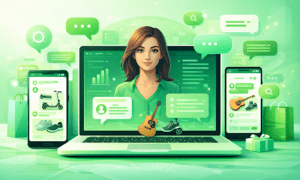In today’s digital age, customer service is a cornerstone of business success. With the rapid advancement of technology, businesses are constantly seeking innovative ways to enhance their customer service operations. One such innovation that has taken the customer service world by storm is ChatGPT, a revolutionary chatbot powered by artificial intelligence. In this article, we will delve deep into the impact of ChatGPT on customer service, exploring how it is transforming the way businesses interact with their customers.
Introduction
The Rise of Chatbots
Before we dive into the specifics of ChatGPT, let’s first understand the evolution of chatbots in the customer service landscape. Chatbots are computer programs designed to simulate human conversation, providing automated responses to user queries. The concept of chatbots has been around for decades, but it is in recent years that they have gained widespread adoption.
Traditional chatbots were often limited in their capabilities, relying on predefined scripts and rule-based responses. While they served a purpose in handling routine queries, they struggled with understanding context and providing personalized interactions. This is where ChatGPT comes into play, representing a significant leap forward in the world of chatbots.
ChatGPT: The Game Changer
ChatGPT, developed by OpenAI, is a cutting-edge natural language processing (NLP) model that has pushed the boundaries of what chatbots can achieve. Unlike its predecessors, ChatGPT is powered by deep learning and can understand and generate human-like text with remarkable accuracy. Here’s how it’s revolutionizing customer service:
Enhanced Conversational Abilities: ChatGPT has the ability to engage in dynamic and context-aware conversations. It can understand the nuances of human language, making interactions with customers feel more natural and less robotic. This improved conversational ability has significantly raised the bar for customer service chatbots.
Personalization: Personalization is key to providing exceptional customer experiences. ChatGPT can analyze user data and tailor responses based on individual preferences and past interactions. This level of personalization fosters a stronger bond between the customer and the brand.
24/7 Availability: Unlike human agents who have limited working hours, ChatGPT can operate round the clock, ensuring that customers receive assistance whenever they need it. This not only improves customer satisfaction but also reduces response times.
Scalability: Businesses often face challenges in scaling their customer service operations to meet growing demands. ChatGPT can handle an unlimited number of conversations simultaneously, making it a cost-effective solution for businesses of all sizes.
Reduced Workload for Human Agents: ChatGPT can handle routine queries and tasks, allowing human agents to focus on more complex and high-value interactions. This not only increases agent productivity but also frees them from repetitive tasks, leading to higher job satisfaction.
Multilingual Support: In today’s global marketplace, multilingual support is essential. ChatGPT can communicate in multiple languages, breaking down language barriers and expanding the reach of businesses to a wider customer base.
Data-Driven Insights: ChatGPT generates valuable data from customer interactions, which businesses can use to gain insights into customer behavior, preferences, and pain points. This data-driven approach enables businesses to make informed decisions and refine their customer service strategies.
Real-World Applications
ChatGPT is not just a theoretical concept; it is making a tangible impact across various industries:
E-Commerce: Online retailers are using ChatGPT to assist customers with product recommendations, order tracking, and resolving inquiries. The ability to provide personalized product suggestions based on customer preferences has led to increased sales and customer satisfaction.
Healthcare: ChatGPT is being integrated into healthcare platforms to answer patient questions, schedule appointments, and provide medical information. It has proven especially valuable during the COVID-19 pandemic, offering reliable information to concerned individuals.
Finance: Financial institutions are using ChatGPT to handle routine banking queries, such as balance inquiries, transaction history, and account management. The chatbot’s ability to securely handle sensitive financial data has boosted customer confidence.
Hospitality: Hotels and travel agencies are using ChatGPT to assist with booking reservations, providing travel recommendations, and answering guest inquiries. The chatbot’s availability 24/7 ensures that travelers receive immediate assistance, improving their overall experience.
Challenges and Considerations
While ChatGPT offers numerous benefits, there are some challenges and considerations to keep in mind:
Ethical Use: Ensuring that ChatGPT is used ethically and responsibly is crucial. Businesses must be transparent about the use of chatbots and provide options for customers to interact with human agents when necessary.
Data Privacy: Handling customer data requires strict adherence to data privacy regulations. Businesses must implement robust security measures to protect customer information when using ChatGPT.
Training and Maintenance: ChatGPT requires continuous training and maintenance to stay up to date and provide accurate responses. Neglecting this aspect can lead to deterioration in performance.
Integration: Seamlessly integrating ChatGPT into existing systems and workflows can be complex. Businesses should carefully plan the implementation process to maximize its benefits.
Conclusion
ChatGPT is revolutionizing customer service by offering enhanced conversational abilities, personalization, and scalability. Its impact spans across industries, providing businesses with a powerful tool to improve customer experiences and streamline operations. However, businesses must navigate ethical considerations and data privacy concerns while implementing and maintaining ChatGPT. As technology continues to advance, the role of ChatGPT in customer service will only become more prominent, reshaping the way businesses interact with their customers in the digital age.



































